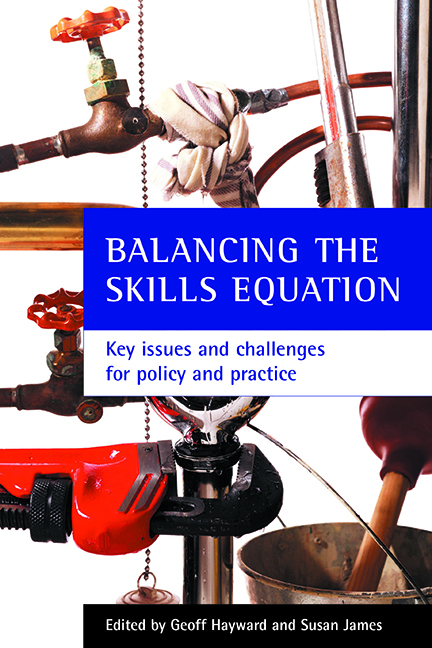Book contents
- Frontmatter
- Contents
- Acknowledgements
- Preface
- Notes on contributors
- one Producing skills: conundrums and possibilities
- two Fit for purpose? Sixty years of VET policy in England
- three The European policy regarding education and training: a critical assessment
- four ‘I can’t believe it’s not skill’: the changing meaning of skill in the UK context and some implications
- five Qualifying for a job: an educational and economic audit of the English 14-19 education and training system
- six Does apprenticeship still have meaning in the UK? The consequences of voluntarism and sectoral change
- seven Tradition and reform: modernising the German dual system of vocational education
- eight Learning in the workplace: reappraisals and reconceptions
- nine Interests, arguments and ideologies: employers’ involvement in education–business partnerships in the US and the UK
- ten Compatible higher education systems and the European labour market: Bologna and beyond
- eleven The expansion of higher education: economic necessity or hyperinflation?
- twelve Becoming a chef: the politics and culture of learning
- Index
- Also available from The Policy Press
four - ‘I can’t believe it’s not skill’: the changing meaning of skill in the UK context and some implications
Published online by Cambridge University Press: 20 January 2022
- Frontmatter
- Contents
- Acknowledgements
- Preface
- Notes on contributors
- one Producing skills: conundrums and possibilities
- two Fit for purpose? Sixty years of VET policy in England
- three The European policy regarding education and training: a critical assessment
- four ‘I can’t believe it’s not skill’: the changing meaning of skill in the UK context and some implications
- five Qualifying for a job: an educational and economic audit of the English 14-19 education and training system
- six Does apprenticeship still have meaning in the UK? The consequences of voluntarism and sectoral change
- seven Tradition and reform: modernising the German dual system of vocational education
- eight Learning in the workplace: reappraisals and reconceptions
- nine Interests, arguments and ideologies: employers’ involvement in education–business partnerships in the US and the UK
- ten Compatible higher education systems and the European labour market: Bologna and beyond
- eleven The expansion of higher education: economic necessity or hyperinflation?
- twelve Becoming a chef: the politics and culture of learning
- Index
- Also available from The Policy Press
Summary
All art is at once surface and symbol. Those who go beneath the surface do so at their peril. (Wilde, 2000, preface, p 4)
Everyone knows what a skilled worker is …. (Institute of Directors, 1991, p 23)
When talking to employers about their skill needs, the discussion nearly always focuses to a large extent on the personal attributes and attitudes sought in employees. (Dench et al, 1998, p 91)
Employability is the most vital skill needed by the nation’s workforce. (BCC 1998, cited in Hyland, 1999, p 73)
Our evidence has required us to consider and accept the implication that ‘skill’ is a ‘humpty-dumpty’ word; it means just what the user wants it to mean. (Oliver and Turton, 1982, p 198)
Introduction
For at least two decades, UK policy makers have insisted that national economic competitiveness and social well-being depends upon a suitably skilled, flexible and motivated workforce (see Mansfield, 2000). At the same time, it is increasingly apparent that the term ‘skill’ has a much broader application today compared to 30 years ago, when it tended to be equated mainly with the physical dexterity and technical ‘know-how’ of the manual craft worker (Rainbird, 1997; Keep and Mayhew, 1999; Payne, 2000). The reports of the National Skills Task Force (NSTF) reveal that ‘skills talk’ now incorporates a whole new language of ‘generic skills’, ‘reasoning skills’, ‘work process management skills’ as well as “personal values and attitudes such as motivation, discipline, judgement, leadership and initiative” (NSTF, 1998, p 15). Today, technical or occupational skills are only the tip of a veritable skills iceberg comprising what, on closer inspection, would appear to be a vast array of personal characteristics, attitudes, dispositions, values and behaviours (see Hyland, 1999).
Of course, British employers have always been interested in the prospective behaviour and attitude of those they recruit, and have a long-established reputation for blaming the education system for failing to produce the kind of young people needed for industrial success (Aldcroft, 1992). One can go back at least as far as the 1906 government investigation into Higher Elementary Schools and discover that:
what employers wanted from these more advanced schools for the children of the working class was a good character, qualities of subservience and general handiness. (Reeder, 1979, p 184)
- Type
- Chapter
- Information
- Balancing the Skills EquationKey Issues and Challenges for Policy and Practice, pp. 53 - 76Publisher: Bristol University PressPrint publication year: 2004

